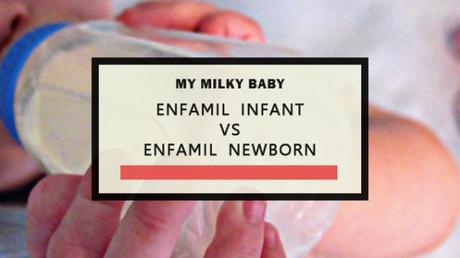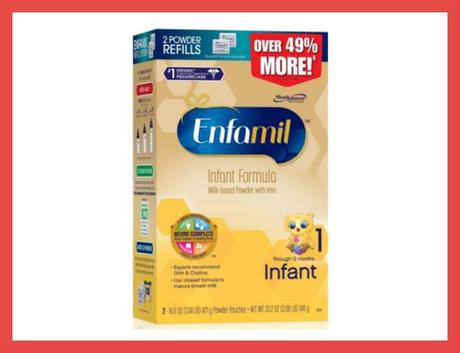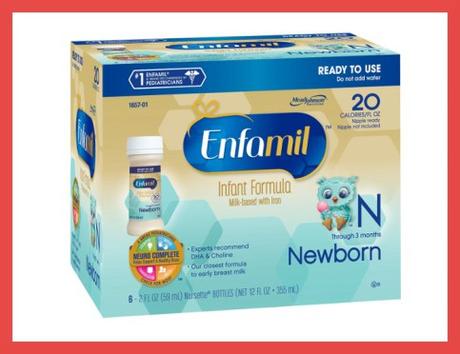
There are so many baby formula choices on the market that choosing a formula to start your baby on can be very overwhelming. Which formula is best for your baby? What if your baby doesn’t do well on the formula you choose? Researching formulas is a great way to increase the chances that you will choose the best formula for your baby on the first try. The difference between Enfamil Newborn and Infant is small, but knowing the similarities and differences between the formulas will help you make the right choice for your baby.
Before starting, I would love to mention that some links in this page can take you to Amazon.com, where you can see prices, customer reviews, product specs, etc.
Enfamil Infant Formula
 Enfamil Infant was created specifically to meet the needs of babies from birth until one year. This formula contains nutrients that nourish your baby’s brain, including DHA, choline, and iron. It also has dual probiotics, which are designed to provide support to your baby’s growing immune system. Enfamil Infant is one of the closest formulas to mature breast milk, so it is a great option for moms who are looking for a good supplement to feed their mostly breastfed baby. Here are the amounts of some of the most important ingredients in Enfamil Infant:
Enfamil Infant was created specifically to meet the needs of babies from birth until one year. This formula contains nutrients that nourish your baby’s brain, including DHA, choline, and iron. It also has dual probiotics, which are designed to provide support to your baby’s growing immune system. Enfamil Infant is one of the closest formulas to mature breast milk, so it is a great option for moms who are looking for a good supplement to feed their mostly breastfed baby. Here are the amounts of some of the most important ingredients in Enfamil Infant:
- Vitamin D- 60 IU for every 100 calories
- The ratio of whey to casein is 60:40 in Enfamil Infant
- The protein level is 2 grams per 100 calories.
Parents who feed their babies Enfamil Infant formula generally found that it is easy-to-use and convenient. They also found that it doesn’t form as many bubbles as most other baby formulas. Their main complaint is that Enfamil is expensive. Many parents switched their babies from Enfamil Newborn to Enfamil Infant with no issues.
Enfamil Newborn Formula
 This Formula has the same blend of brain-supporting nutrients as Enfamil Infant. The main difference between Enfamil Newborn and Infant formula is that Enfamil Newborn was designed to mimic the composition of the mother’s milk during the baby’s first week of life. It is the Enfamil formula that is designed specifically for babies that are three months old or younger. Here are the amounts of some key ingredients in Enfamil Newborn:
This Formula has the same blend of brain-supporting nutrients as Enfamil Infant. The main difference between Enfamil Newborn and Infant formula is that Enfamil Newborn was designed to mimic the composition of the mother’s milk during the baby’s first week of life. It is the Enfamil formula that is designed specifically for babies that are three months old or younger. Here are the amounts of some key ingredients in Enfamil Newborn:
- Vitamin D- 75 IU for every 100 calories
- Ratio of Whey to Casein- 80:20
- Protein- 2.1 grams in every 100 calories
Parents who use Enfamil Newborn in ready to feed bottles usually appreciate how easy it is to use. Any nipple can be connected to the bottles, and there is a ml guide on the side of the bottle so that you can easily see how much formula your baby is eating. Some parents found that Enfamil Newborn caused their baby to be gassy or have diarrhea, likely because it contains a higher amount of lactose than many formulas. Watch your baby carefully to ensure that they are tolerating the formula well.
You can also read: Best Formula to Reduce Spit Up
What is the Difference Between Enfamil Newborn and Infant?
One Difference between Enfamil Newborn and Infant is the level of vitamin D each one contains. Since the amount of vitamin D in Enfamil Infant is lower than in Enfamil Newborn, pediatricians often recommend that babies who drink less than one liter of Enfamil Infant formula each day take a vitamin D supplement. Another difference is that Enfamil Newborn is designed to be used only by very young babies, while Enfamil Infant is formulated for babies from birth to 12 months old.
The Table below is showing the similarity and difference between each formula.
Nutrients are per 100 calories (5 fl oz)
Infant Formula Newborn Formula
PROTEIN (g) 2 2.1
FAT (g) 5.3 5.3
CARBOHYDRATE (g) 11.3 11.3
VITAMIN A (IU) 300 300
VITAMIN D (IU) 60 75
VITAMIN E (IU) 2 2
VITAMIN K (mcg) 9 9
VITAMIN THIAMIN B1 (mcg) 80 80
VITAMIN RIBOFLAVIN B2 (mcg) 140 140
VITAMIN B6 (mcg) 60 60
VITAMIN B12 (mcg) 0.3 0.3
NIACIN (mcg) 1000 1000
FOLACIN (mcg) 16 16
PANTOTHENIC ACID (mcg) 500 500
BIOTIN (mcg) 3 3
ASCORBIC ACID (mg) 12 12
CHOLINE (mg) 24 24
INOSITOL (mg) 6 6
CALCIUM (mg) 78 78
PHOSPHORUS (mg) 43 43
MAGNESIUM (mg) 8 8
IRON (mg) 1.8 1.8
ZINC (mg) 1 1
MANGANESE (mcg) 15 15
COPPER (mcg) 75 75
IODINE (mcg) 15 15
SELENIUM (mcg) 2.8 2.8
SODIUM (mg) 27 27
POTASSIUM (mg) 108 108
CHLORIDE (mg) 63 63
*Reference: enfamil.com
Be sure to talk to your doctor about the formula that your baby drinks and ask for advice before switching to a new formula, even if you are switching from Newborn to Infant Enfamil.
One of the most important things you can do as a mom is paying close attention to any changes in your baby’s temperament. It is obvious to parents that they should consider changing the formula their baby is eating if the baby gets diarrhea or cries for hours at a time. Many babies have reactions to formula that as noticeable. Your baby’s skin may become red, scaly, or dry. They may also be more tired than usual, or are spitting up way more than usual. Failure to gain weight is another sign of formula intolerance. It’s always best to talk to your doctor if you have questions or concerns. After all, nobody knows your baby’s normally better than you do!
You can find here two quick tips to help your baby’s reflux
